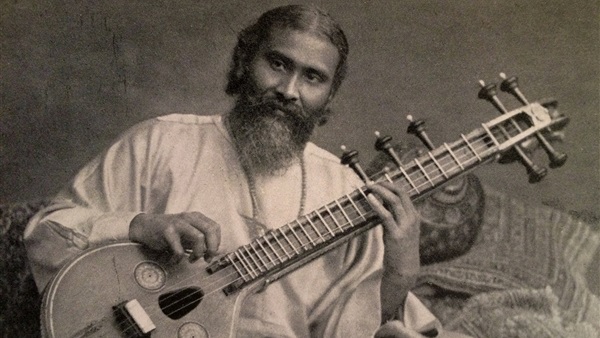Exceptional understanding of Sufism

It was Sufi
guru Hazart Inayat Khan, who freed Sufism from textual fetters and restrictions.
Khan’s success in this respect was his guidebook to the Sufism in Western
communities. He also founded the school International Sufi Order, whose lyrics and
doctrines have been chiming since then across Europe.
Khan was
born in Paroda village in India on July 5, 1882. His family home was echoing
with music and rhythmic Sufi songs and lyrics. His father Mashaikh Rahmat Khan belonged
to a wealthy family, whose members were land owners. Khan’s grandparents were
also popular for their love to music, Sufism and poetry.
His mother,
Khatija Bi was the daughter of Sholay Maula Bakhsh (1833-1896), an Indian
musician and songwriter. Bakhsh had a great influence on his grandchild’s love
to music and spiritual lyrics and mantras. The maternal grandparent used to
host poets, admirers and music composers, who belonged to different faiths and
cultures.
Khan’s Sunni
Muslim family was loyal to the Chishti, a Sufi order that began in the small
town of Chisht in Herat in Afghanistan about 930 CE. Admiring its popularity
and serenity, Mogul emperors sought the help of Chishti to resist ideological
extremism.
Khan’s
family used to organize zekr (spiritual orgies), which echoed with
recitations of prayers, and Sufi poems and lyrics. Greatly impressed by such an
overwhelming spiritual atmosphere, Khan became immune to the rigidity and restrictions
of the religious text. That is why in his childhood, Khan set out to search for
that spiritual vision, which could embrace all faiths and philosophies. His vision
in this respect bore similarity with Ghanousiya, a spiritual school, which was
believed to help free the person from the fetters of the text and inspire h/her
union with God.
Khan’s
talent for music was revealed in his childhood. At the age of nine, he received
a reward from an Indian Maharaja for beautifully singing a Sanskrit serenade
during a signing party held in the village. The reward included a scholarship.
Khan published his first book on music, Balsan Gitmala, in Hindustani when
he was 14 years old. After six years, he
took on teaching in the music academy, Gayanshala (now Paroda Music College),
which was founded by his grandparent in 1886.
Khan was hit
by a big disappointment in 1896 when he lost his grandparent Maulabakhshi, the great musician. After four years, his younger
brother Karamat Khan passed away at 10. To
get past his sorrows, he devoted himself to composing spiritual music, which earned
him big popularity in the area.
A turning point in Khan’s career was
his trip to Haidarabad. There, he published several books, the most important
of which was “The Minqar-i Musiqar”,
which revived a great deal of spirituality-inducing music composed by his
grandparent.
It was also in Haidarabad, in which
Khan came across Mohamed Abu-Hashimi al-Madani, known as Maulana al-Hashimi,
who taught him doctrines of Sufism founded by the main four Sufi schools
Chishti, Qadiriya and Naqshabandiya.
Al-Hashimi was greatly interested in
Persian and Arabic literature. He was also popular in the village as a Sufi guru.
Al-Hashimi was proud that his grandparents were of Arabian origin in the holy
city of Medina in Arab peninsula. .
Khan used to visit Al-Hashimi at his
home to listen to his explanations of mysticism and spiritually. Although he
recorded his teacher’s expressions and elaborations, Khan introduced his own
vision and understanding in his writings. Al-Hashimi influenced Khan’s writings about
the relationship between the Sufi guru and his disciple, and the influence of such
an exceptional relationship in the person’s spiritual life.
Khan’s writings also elaborated his
understanding of Sufi practices, which could help the person overcome the ego
and discover the secret of the existence.
Following a deathbed advice from
al-Hashimi, Khan travelled to Europe to broadcast his spirituality-inducing music.
In 1910, two years after al-Hashimi had passed away, Khan, escorted by his
brothers, travelled to Calcutta, and from there he boarded a ship bound for
Europe. His first destination was France. During his eight-year stay (from 1912
to 1920) in this European country, he studied psychology. He also formed, in collaboration
with his brothers, he formed a band, whose Indian music gained popularity in
France.
After a brief sojourn in Britain,
Khan returned to France to establish his school of International Sufi Order. He
opened ISO’s branch in London in 1916, and in Geneva in 1922 (now managed by
his grandson Pir Zia Inayat Khan).
Khan published several books on
Sufism and how to achieve union with God. His most important books are,
however, “The Heart of Sufism”, “The Message of Sufism”, “The Mysticism of
Sound and Music”, “The Inner Life” and ‘The Way of Illumination”.
Khan’s Sufis school gained tremendous
popularity across Europe. He was invited to give lectures in France and Holland
(from 1921-1926). He was also invited to the United States to illuminate his
admirers there on his Sufi doctrines and practices. .
Khan was married twice and had four
children from his second wife Amina Begum. Receiving the torch from their
father, Khan’s children resumed broadcasting his spiritual messages across the
world. Khan decided to return to India
in 1926. He passed away on February 5, 1927.
One of Khan’s sons, Pir Vilayat
Inayat Khan, is acknowledged in several European countries for spreading his
father’s Sufi doctrines and principles. Born in 1916, Khan Jr. set about broadcasting
his father’s spiritual and illuminating message in 1956 until his death in
2004.
Khan’s daughter Nour Inayat was a
talent and also an anti-Nazi activist. She cooperated with the British
intelligence when she migrated from France during the World War Second. However,
German secret police were tipped off about her activities. She was arrested and
executed in 1944.
A statue featuring this Muslim woman
in the Golden Square Gardens in London acknowledges her efforts to help save
Jews from Hitler’s Holocaust.







